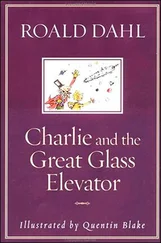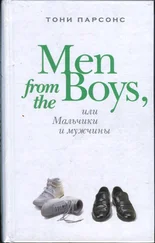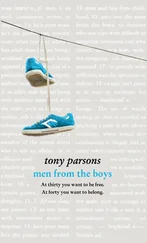Roald Dahl - Man from the South
Здесь есть возможность читать онлайн «Roald Dahl - Man from the South» весь текст электронной книги совершенно бесплатно (целиком полную версию без сокращений). В некоторых случаях можно слушать аудио, скачать через торрент в формате fb2 и присутствует краткое содержание. Жанр: Языкознание, Ужасы и Мистика, на английском языке. Описание произведения, (предисловие) а так же отзывы посетителей доступны на портале библиотеки ЛибКат.
- Название:Man from the South
- Автор:
- Жанр:
- Год:неизвестен
- ISBN:нет данных
- Рейтинг книги:4 / 5. Голосов: 1
-
Избранное:Добавить в избранное
- Отзывы:
-
Ваша оценка:
- 80
- 1
- 2
- 3
- 4
- 5
Man from the South: краткое содержание, описание и аннотация
Предлагаем к чтению аннотацию, описание, краткое содержание или предисловие (зависит от того, что написал сам автор книги «Man from the South»). Если вы не нашли необходимую информацию о книге — напишите в комментариях, мы постараемся отыскать её.
Man from the South — читать онлайн бесплатно полную книгу (весь текст) целиком
Ниже представлен текст книги, разбитый по страницам. Система сохранения места последней прочитанной страницы, позволяет с удобством читать онлайн бесплатно книгу «Man from the South», без необходимости каждый раз заново искать на чём Вы остановились. Поставьте закладку, и сможете в любой момент перейти на страницу, на которой закончили чтение.
Интервал:
Закладка:
'Do you mean that when they die they eat them instead of burying them?'
'They don't wait for them to die, dear. They kill them.'
'How do they kill them, Aunt Glosspan?'
'They usually cut their throats with a knife.'
'But what kind of animals?'
'Cows and pigs mostly, and sheep.'
'Cows!' the boy cried. 'You mean like our cows?'
'Exactly, my dear.'
'But how do they eat them, Aunt Glosspan?'
'They cut them up into little bits and they cook them. They like the meat best when it's all red and bloody and sticking to the bones. They love to eat cow's flesh with the blood running out of it.'
'Pigs too?'
'They love pigs.'
'Lumps of pig's meat,' the boy said. 'Imagine that. What else do they eat, Aunt Glosspan?'
'Chickens.'
'Chickens? Feathers too?'
'No, dear, not the feathers. Now go outside and play, will you?'
Soon after that, the lessons began. There were five subjects, including reading and writing, but cooking was the most popular with both teacher and pupil. In fact, it soon became very clear that young Lexington was a talented cook. He was clever and quick. In so young a boy, this surprised Aunt Glosspan and she could not quite understand it at all. But she was very proud of him and thought that the child would have a wonderful future.
'How good it is,' she said, 'that I have such a wonderful little fellow to look after me when I'm old.' A couple of years later, she left the kitchen for ever, and put Lexington in charge of all household cooking. The boy was now ten years old, and Aunt Glosspan was nearly eighty. Alone in the kitchen, Lexington immediately began experimenting with dishes of his own invention. There were hundreds of new ideas in his head. Hardly a day went by without some wonderful new dish being placed on the table. There were many delicious inventions. Aunt Glosspan had never tasted food like this in all her life. In the mornings, before lunch, she would go outside the house and sit there in her chair, thinking about the coming meal. She loved to sit there and smell what came through the kitchen window.
Then he would come out, this ten-year-old child, a little smile of pleasure on his face and a big steaming pot of the most wonderful food imaginable in his hands.
'Do you know what you ought to do?' his aunt said to him, eating the food. 'You ought to sit down and write a cookbook.
He looked at her across the table, eating slowly.
'Why not?' she cried. 'I've taught you how to write and I've taught you how to cook, and now you've only got to put the two things together. You write a cookbook, my darling, and it'll make you famous all over the world.'
'All right,' he said. 'I will.'
And that same day, Lexington began writing the first page of that great book on which he worked for the rest of his life. He called it Eat Well And Healthily. Seven years later, by the time he was seventeen, he had recorded over nine thousand different recipes, all of them original, all of them wonderful.
But now, suddenly, his work was interrupted by the death of Aunt Glosspan. She was ill during the night and Lexington found her lying on the bed screaming with pain. She was a terrible sight. The boy wondered what he should do. Finally, to cool her down, he fetched a bucket of water from the river and poured it over her head, but this only made her worse, and the old lady died in an hour.
'This is really too bad,' the poor boy said, pinching her several times to make sure that she was dead. 'And how sudden! Only a few hours ago she seemed in the very best health. She even ate three large portions of my newest mushroom dish and told me how good it was.'
After crying bitterly for several minutes, because he had loved his aunt very much, he carried her outside and buried her in the garden.
The next day, while he was tidying up her things, he found an envelope that was addressed to him in Aunt Glosspan's handwriting. He opened it and took out two fifty-dollar notes and a letter. The letter said:
Darling boy, I know that you have never been down the mountain since you were thirteen days old, but as soon as I die you must put on a pair of shoes and a clean shirt and walk down into the village and find the doctor. Ask the doctor to give you a death certificate. Then take this to my lawyer, a man called Mr Samuel Zuckermann, who lives in New York City and who has a copy of my will. Mr Zuckermann will arrange everything. The money in this envelope is to pay the doctor for the certificate and for the cost of your journey to New York. Mr Zuckermann will give you more money when you get there, and it is my wish that you use it to continue your work on that great book of yours until you are satisfied that it is complete in every way. Your loving aunt, Glosspan Lexington, who had always done everything his aunt had told him, put the money in his pocket, put on a pair of shoes and a clean shirt, and went down the mountain to the village where the doctor lived.
'Old Glosspan?' the doctor said. 'Is she dead?'
'Certainly she's dead,' the boy answered. 'If you come home with me now I'll dig her up and you can see for yourself.'
'How deep did you bury her?' the doctor asked.
'Two or three metres down, I think.'
'And how long ago?'
'Oh, about eight hours.'
'Then she's dead,' the doctor announced. 'Here's the certificate.'
Lexington now left for the city of New York to find Mr Samuel Zuckermann. He travelled on foot, and he slept under bushes, and he lived on berries and wild plants, and it took him sixteen days to reach the city.
'What a place this is!' he cried, as he stood staring around him. 'There are no chickens or cows anywhere and none of the women looks like Aunt Glosspan at all.'
Lexington had never seen anyone like Mr Zuckermann before, either.
He was a small man with a large nose, and when he smiled, bits of gold flashed at you from lots of different places inside his mouth. In his office, he shook Lexington warmly by the hand and congratulated him on his aunt's death.
'I suppose you know that your dearly loved aunt was a woman of great wealth?' he said.
'Do you mean the cows and the chickens?'
'I mean five hundred thousand dollars,' Mr Zuckermann said.
'How much?'
'Five hundred thousand dollars, my boy. And she's left it all to you.' Mr Zuckermann leaned back in his chair. 'Of course, I shall have to take 50 per cent for my services,' he said, 'but that still leaves you with two hundred and fifty thousand dollars.'
'I am rich!' Lexington cried. 'This is wonderful! How soon can I have my money?'
'Well,' said Mr Zuckermann, 'luckily for you, I know the people at the city tax office and I'm confident that I'll be able to persuade them to forget about any taxes that your aunt owed.'
'How kind you are,' said Lexington.
'I shall have to give some people a small tip, of course.'
'Whatever you say, Mr Zuckermann.'
'I think a hundred thousand would be enough.'
'But how much does that leave for me?' the youth asked.
'One hundred and fifty thousand. But then you've got the funeral expenses to pay out of that.'
'Funeral expenses?'
'You've got to pay the funeral company. Surely you know that?'
'But I buried her myself, Mr Zuckermann, in the field behind the house. I never used a funeral company.'
'Listen,' Mr Zuckermann said patiently. 'You may not know it but there is a law in this State which says that no one can receive any money from a will until the funeral company has been paid.'
'You mean that's a law?'
'Certainly it's a law, and a very good law, too. Funerals are one of our country's great traditions. They must be protected at all costs.' Mr Zuckermann himself, together with a group of doctors, controlled a large funeral company in the city. The celebration of death was therefore a deeply religious affair in Mr Zuckermann's opinion. 'You had no right to go out and bury your aunt like that,' he said. 'None at all.'
Читать дальшеИнтервал:
Закладка:
Похожие книги на «Man from the South»
Представляем Вашему вниманию похожие книги на «Man from the South» списком для выбора. Мы отобрали схожую по названию и смыслу литературу в надежде предоставить читателям больше вариантов отыскать новые, интересные, ещё непрочитанные произведения.
Обсуждение, отзывы о книге «Man from the South» и просто собственные мнения читателей. Оставьте ваши комментарии, напишите, что Вы думаете о произведении, его смысле или главных героях. Укажите что конкретно понравилось, а что нет, и почему Вы так считаете.








